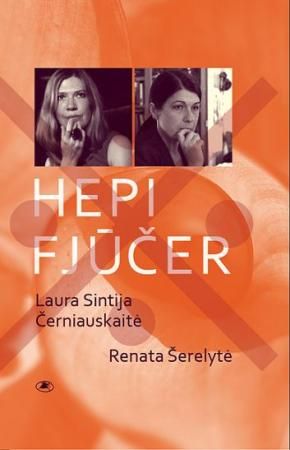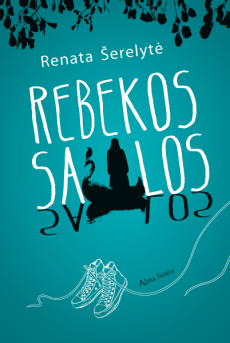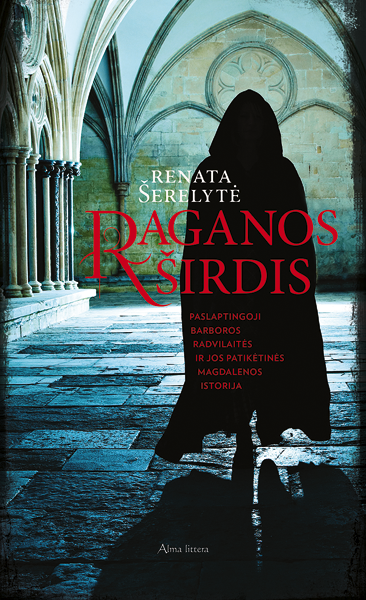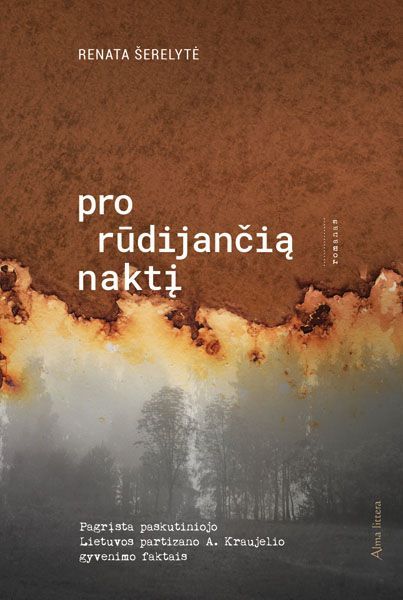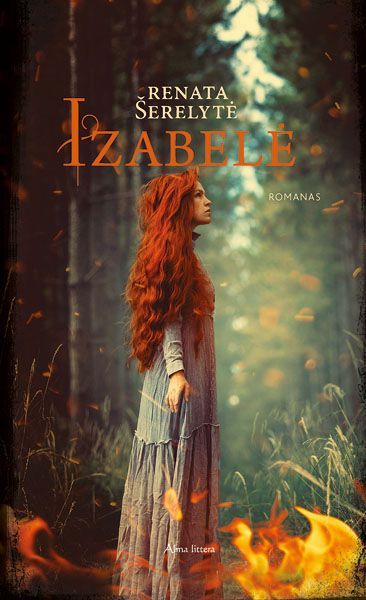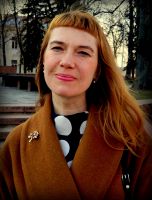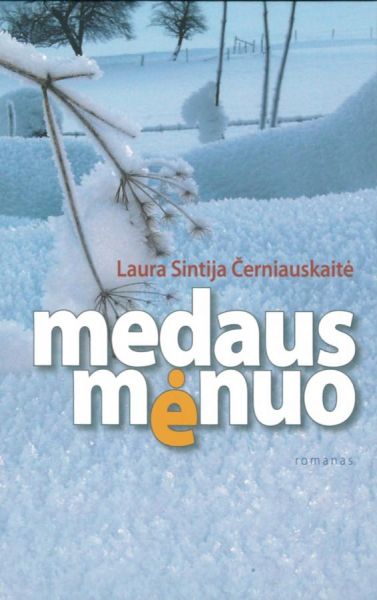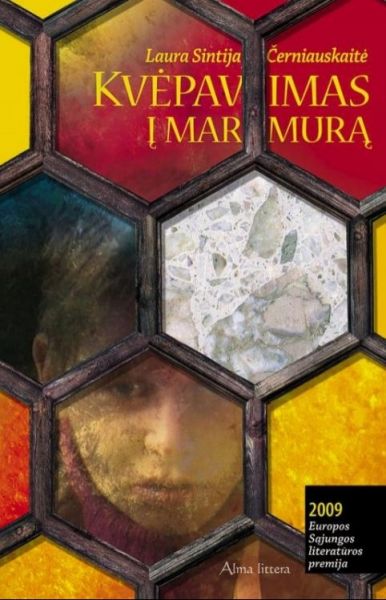Laura Sintija ČERNIAUSKAITĖ
Great–great grandmother
The summer is sunny and windy. Cumulus clouds float by so quickly that their paths become a never–ending film. Boats sail in, giant elephants and giraffes disembark, injured crusaders fall from the trotters and their wounds heal before your eyes, the princess adjusts her veil – her hairstyle becomes disheveled, a small mirror falls out of her hand and she grows a witch’s nose. Everything there is different than it is on earth. When things get boring here, below, then you can always toss your head back to the sky. The sky is endless, adults say that it is impossible to imagine this. But why always just imagine? This calms and comforts me because then it means that the sky is one thing that is eternal. At least, one of the things that I know about. Everything else ends, quite quickly. Candies in a bag, summer, the textbooks of first grade. The life of a dog, even the life of a human ends. But the sky always exists, it always hangs above y
...Laura Sintija ČERNIAUSKAITĖ
Great–great grandmother
The summer is sunny and windy. Cumulus clouds float by so quickly that their paths become a never–ending film. Boats sail in, giant elephants and giraffes disembark, injured crusaders fall from the trotters and their wounds heal before your eyes, the princess adjusts her veil – her hairstyle becomes disheveled, a small mirror falls out of her hand and she grows a witch’s nose. Everything there is different than it is on earth. When things get boring here, below, then you can always toss your head back to the sky. The sky is endless, adults say that it is impossible to imagine this. But why always just imagine? This calms and comforts me because then it means that the sky is one thing that is eternal. At least, one of the things that I know about. Everything else ends, quite quickly. Candies in a bag, summer, the textbooks of first grade. The life of a dog, even the life of a human ends. But the sky always exists, it always hangs above your head and watches with its limitless eye.
Here, below, there is one mysterious, though already almost terminal thing. That is the old manor. I approach it on the path overgrown with lilac bushes. When I was very young, mother pushed me here in a pram. Once, we were attacked by a rabid animal, but mother protected us. She said that the lilac path was planted when she was finishing her studies, but I think that she again had it confused. It looks like the lacy petticoats of the countess have turned into this shrubbery.
A small, thin birch tree grows on the terrace, with the remaining wall of the manor building dotted with window holes and the holey roof. In the yard there is a stone fountain with a moss– covered bottom, and behind the house among the old linden trees, there is a pond overgrown with duckweed. Sweetbriar, nettle, and burdock reign here like fans lost by the Polish ladies. Rimvydis built an auto service station in the stable.
In the mansion, there are folding front doors engraved with ornaments. They are nailed shut, but the kids sneak in through the windows, play hide– and– seek, smoke and do goodness knows what else. I’ve never been inside. It seems to me that to steal into the mansion through a window is the same as trying to eat a cake through your ear. It is not nice and it’s impossible. And if the mansion’s doors are locked, it’s better to wait patiently until they open up themselves.
This happened one morning. I was sent to the shop for salt – mother was getting ready to make pancakes and the last pinch of salt suddenly spilled from the overturned jar. I told her, don’t keep salt in ajar, then grandmother, father’s mother started muttering. Mother’s mother also used to keep salt in ajar. She died the summer I learned to ride a bike, but she stands by my desk during arithmetic and helps me solve arithmetic problems. That’s why everyone thinks I am better at arithmetic than spelling. It’s a pity that grandmother doesn’t appear during spelling lessons. Perhaps she herself is a poor speller?
So, I was sent out for salt.
But I somehow inadvertently turned toward the manor. I was going to get salt, but I turned near the manor. The morning was entirely calm, a few small clouds idly floated in the sky – there was no cinema of clouds today. I felt a draft blow through the new entrance inside the manor. It rustled the nettle; it tickled me from afar.
The large wooden doors were open like arms reaching out at me, and human excrement was lying on the threshold. Three fresh sticks of shit like a rune sign proclaiming something incomprehensible. Even though I finished the first grade, I still read poorly, my father says that I am not clever and that after school he will give me away to Rimvydis to wash cars. I squat and see a fleshy, green fly shining on the excrement.
I wonder: how can this be, that radiant things exist with the unclean. This thought catches me, beyond it, like a door, another thought opens, beyond that one, another one – and I reflect as if I was walking from hall to hall in the endless manor. Suddenly, I hear a terrible crackling behind my back. I turn around and see how the wall of lilacs parts and above it sways a ship. A brilliant steed emerges from the bushes, a tiny, bony countess sits on its back, and a ship with a white sail rolls the ocean of her grey curls. The face of the countess is thin and wrinkled, resembling a powdered raisin. From her expression you can’t tell if she is preparing to get angry or if she will soon break into a ravishing smile. She extends a gloved hand with a gigantic ring toward me:
– Help me get down.
But her ring is so heavy that she quickly tires of holding out her hand and changes her mind:
– Or not, stay there.
I stand up in such a way so that I would hide the pile of excrement, because it seems to me that shit and the countess cannot exist together.
– Whose might you be, young lady?
– Osvaldas’s, – I answered as loudly as possible. You have to talk this way to old people.
– Which one? – the countess asked seriously.
– Osvaldas from the pond, – that’s how they referred to father, because we lived by the pond and during his childhood my father drowned there.
– Aha, – she said and studied me further through the slits of her eyes. – And what are you hiding there behind your back?
Confused, I stepped back and heard how the heel of my sandal mashed the crap.
– Well, well, what do you have there? – the countess persisted. With her neck stretched out inquisitively she urged the horse/steed forward, little devils of laughter sparkled in her eyes.
I moved.
– Oh – the countess shrieked.
– That’s not my work, – I explained nervously.
– I know, – the countess giggled covering her mouth with a handkerchief. Then she suddenly become serious and states almost fiercely:
– If you cover other people’s excrement then nothing good will come of you. You’ll always be the coverer of excrement, and everyone else will be a whole head above you. Do you understand?
– I understand.
– Now sit.
The countess pointed to an empty spot on the saddle in front of her.
– What do you.. .I can’t.. .I was sent for salt... – I whispered neither at the fence nor at the stake.
I’ve never sat on a steed and I’d never met a real countess, and now it befell me all at once. The countess grabbed me by the scruff and threw me onto the saddle, her small hand was bony and superhumanly strong, it was really unbelievable how she did this. A shudder went through my skin.
Now hold on, – the countess whispered, and before I could comprehend how and what to hold on to, we bolted like lightening through the open doors into the abyss of the manor.
There are various types of films. Even that accelerated film of dreams, which when you awake from you only remember interrelated splinters that don’t stick together. Or else – you vividly dreamt something, but what – who knows. This is what it was like for me with that mysterious manor into which the countess and I galloped on the steed. I had waited so long for this moment, and now it was as though I had fallen asleep and dreamt a very quick dream full of people. When the countess returned me to that same place from which she had taken me, nothing had changed. The sun hadn’t even moved from the lilac leaves. Though it seemed to me that there, in the manor, a long life could have been lived. There, a lacy parasol shone in the sun, the wind tore it out of my hands, a heavy locket warmed my heart and the oppressive heat of the desired body pressed against silk sheets. There, a uncomfortably curled up newborn tilted the womb, there remained a flight in the swing under the gigantic dome of the linden tree, the whip of the ash across the shoulders, hounds bounding before you, a bear’s pelt on the wall near the manor’s Dutch– tile stove and suddenly – its coarseness beneath my back and a falling silver goblet with Cupids. Everything fell from me like fragments. I glanced back at the doors of the manor – they were still open, and the smashed windows gaped in hall on the first floor, empty plastic bottles and someone’s nylon stocking lump lay about. The squashed pile of excrement still lay on the threshold. Only now it occurred to me that there was a connection between the excrement and the countess, perhaps even a very direct link. But this was no longer important. I burst into tears from an unspeakable confusion of emotions. The countess compassionately watched me from atop her steed, she even gave me her perfumed handkerchief to blow my nose.
– Now go get the salt, – she said indulgently.
The empty bag rustled in my hand with gentle reproach.
– Will we meet again? – I asked.
– Have we ever been separated? – the countess slyly grinned, and tugged the reins. The steed raised its leg which shined as though lacquered. Before bounding into the lilacs, the countess turned once more:
– By the way, give my greetings to your mother.
How do you know my mother, I wanted to ask, but I was blinded by the diamond in the countess’s earring flashing in the sunlight. Then I was alone.
The next day I loitered and loitered around the manor waiting for something. In the grasses near the estate’s pond I found an earring with a large transparent stone. After I had lifted it before the sun, it was already too late. I remembered a vow to my mother – to never touch lost jewelry because a witch may have lost it. I placed the earring back in the exact same place and I even tucked the grasses under it so that it looked untouched.
In the evening, the earring had turned into a drop of dew, barely larger than the others.
Though, I already felt in my fingertips the rousing power of the witch.
Translated by Dalia Švambarytė
